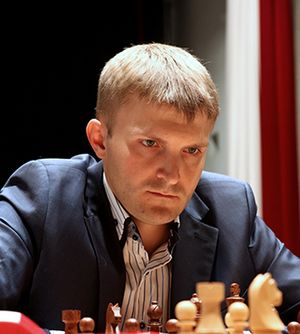Nikita Vitiugov facts for kids
Quick facts for kids Nikita Vitiugov |
|
|---|---|

Vitiugov at Superfinal of the Russian Chess Championship 2018
|
|
| Full name | Nikita Kirillovich Vitiugov |
| Country | Russia (until May 2022) FIDE (May 2022 to August 2023) England (since August 2023) |
| Born | 4 February 1987 Leningrad, Russian SFSR, Soviet Union |
| Title | Grandmaster (2007) |
| FIDE rating | 2722 (February 2026) |
| Peak rating | 2751 (November 2019) |
| Peak ranking | No. 15 (May 2011) |
Nikita Kirillovich Vitiugov (born 4 February 1987) is a very talented chess grandmaster. A grandmaster is the highest title a chess player can get, besides being World Champion. Nikita was born in Russia and played for his home country for many years. Since 2023, he has represented England in international chess events. He made this change because of the conflict in Ukraine.
Nikita has achieved many great things in chess. He was part of the Russian team that won the World Team Chess Championship twice, in 2009 and 2013. He also won the Gibraltar Masters tournament in 2013 and the Grenke Open in 2017. In 2021, he became the champion of the Russian Chess Championship.
Contents
Nikita's Chess Journey
Early Achievements and Grandmaster Title
Nikita Vitiugov showed his chess talent from a young age. In 2005, he became the Russian champion for players under 18. The same year, he was the runner-up at the European under 18 championship. He also finished second in the Russian Junior Championship in both 2006 and 2007. In 2006, he was the runner-up at the World Junior Chess Championship.
In July 2006, Nikita won a tournament in Armenia called "Blue Sevan." This win helped him get the final "norm" he needed to become a Grandmaster. A "norm" is a high-level performance in a chess tournament that helps a player earn a title like Grandmaster. He officially became a Grandmaster in 2007.
Important Tournaments and Rankings
Nikita played in the Russian Championship Superfinal for the first time in December 2006. He continued to play in many important tournaments. In 2008, he won the Baltic Sea Cup in Denmark and the Cup of Russia.
In November 2009, he played in the FIDE World Cup. He won several matches before losing in the fourth round. After his strong results in 2009, his Elo rating went above 2700 for the first time. The Elo rating system is how chess players are ranked based on their performance. A rating over 2700 is considered very high for a chess player.
In 2011, Nikita tied for first place at the Aeroflot Open, a big open tournament. He also played in the World Cup again, reaching the third round.
Winning Major Events
January 2013 was a big month for Nikita. He won the Masters tournament at the Tradewise Gibraltar Chess Festival. He won after a fast playoff match against another strong player, Nigel Short. Later that year, he finished third in the Russian Championship Superfinal.
Nikita also helped other top players. He was a "second" for Peter Svidler in the Candidates Tournaments of 2013 and 2014. A "second" is like a coach or assistant who helps a chess player prepare for matches.
In 2014, he tied for first place again at the Gibraltar Masters, finishing second after a playoff. He continued to perform well, placing third in the Russian Championship Superfinal in 2015. In 2017, he won the Grenke Chess Open, a large tournament in Germany. In December 2017, he tied for first in the Russian Superfinal but lost in the playoff.
In 2019, Nikita won the Masters tournament at the Prague Chess Festival. In 2022, he played in the FIDE Grand Prix 2022, which is a series of tournaments for top players.
Playing for Teams
Representing Russia
Nikita Vitiugov has been a key player in team chess competitions. He first played for the Russian national team in 2009. He helped the Russian team win the gold medal at the World Team Chess Championship in 2009. He played exceptionally well, earning an individual gold medal for his performance on his board.
He also played for Russia at the 39th Chess Olympiad in 2010. In 2011, he won another individual gold medal at the World Team Championship. In 2013, he helped Russia win another team gold medal at the World Team Championship and also won an individual bronze medal. In 2017, his team won a silver medal, and in 2018, he helped Russia win a team bronze medal at the 43rd Chess Olympiad.
Club Team Success
Nikita also plays for club teams. He plays for the Saint Petersburg Chess Federation team in the Russian Team Championship and the European Chess Club Cup. He helped his team win gold at the European Club Cup in 2011. He played very well, earning an individual gold medal on his board.
In 2012, his team won silver at the European Club Cup, and he won an individual bronze medal. In 2013, his team won gold in the Russian Team Championship, and he won an individual bronze. His team, later renamed Mednyi Vsadnik (which means "Bronze Horseman"), won the gold medal again at the European Club Cup in 2018. Nikita also won an individual gold medal in that event.
See also
 In Spanish: Nikita Vitiugov para niños
In Spanish: Nikita Vitiugov para niños
 | Madam C. J. Walker |
 | Janet Emerson Bashen |
 | Annie Turnbo Malone |
 | Maggie L. Walker |

